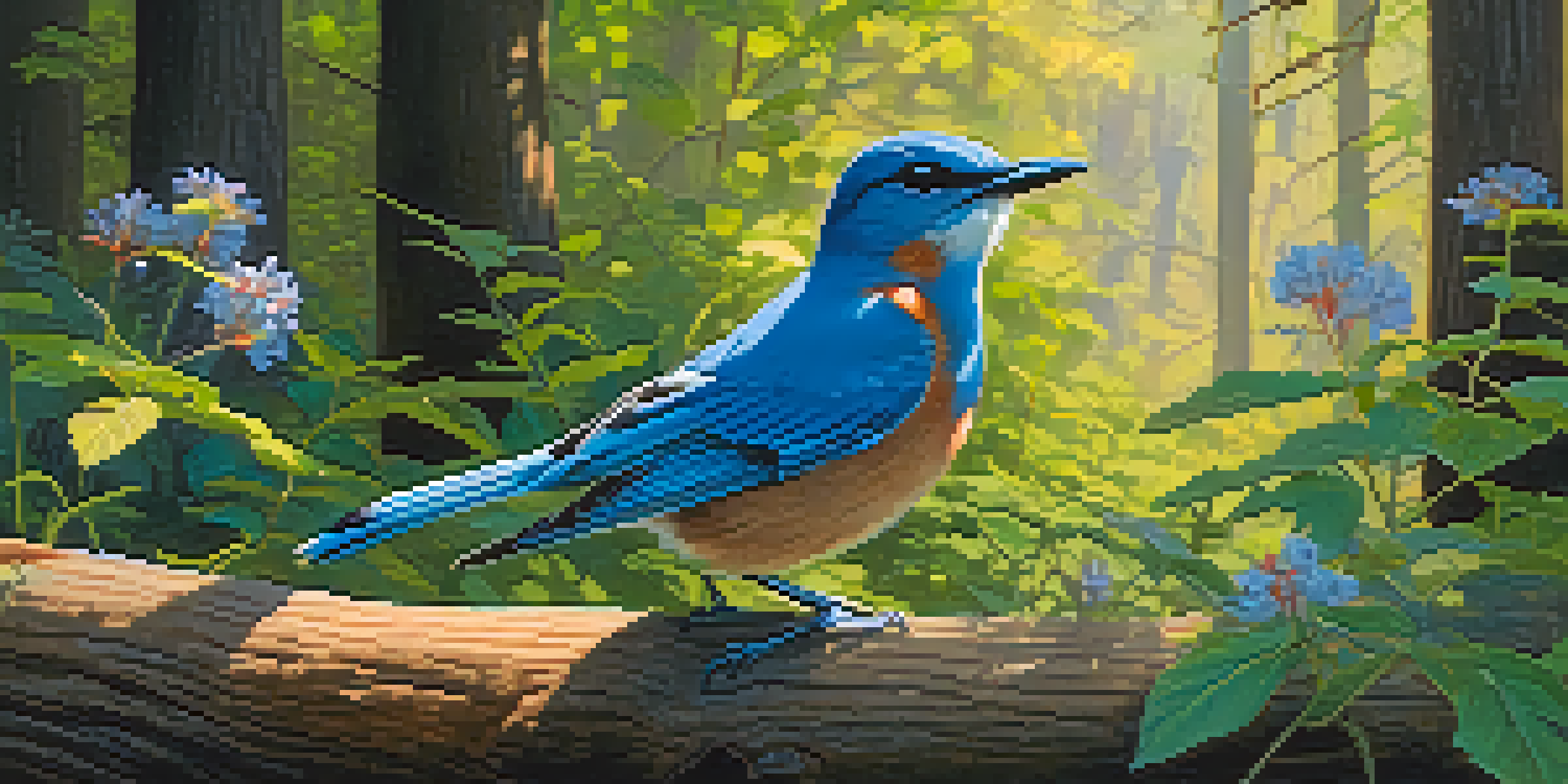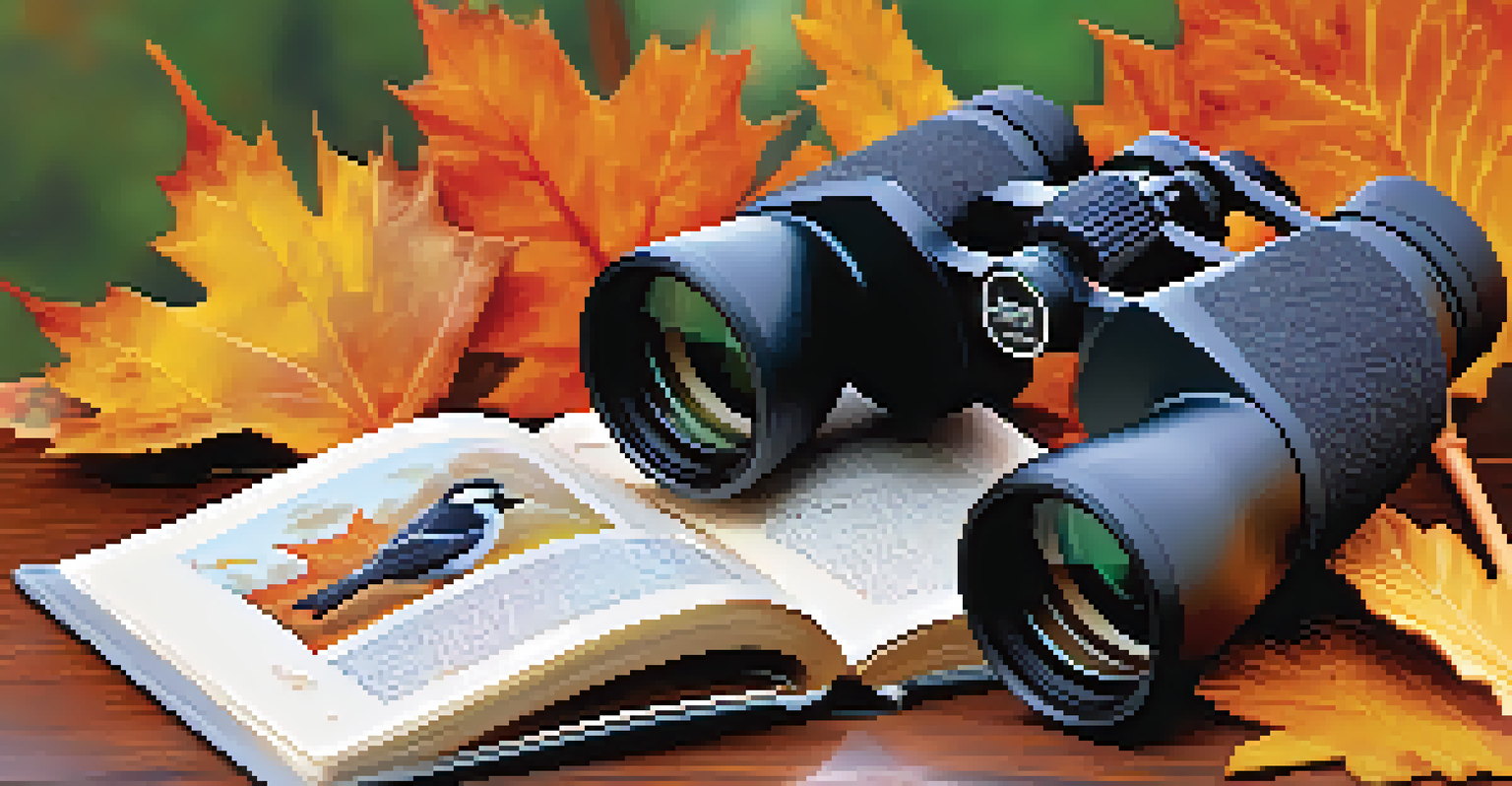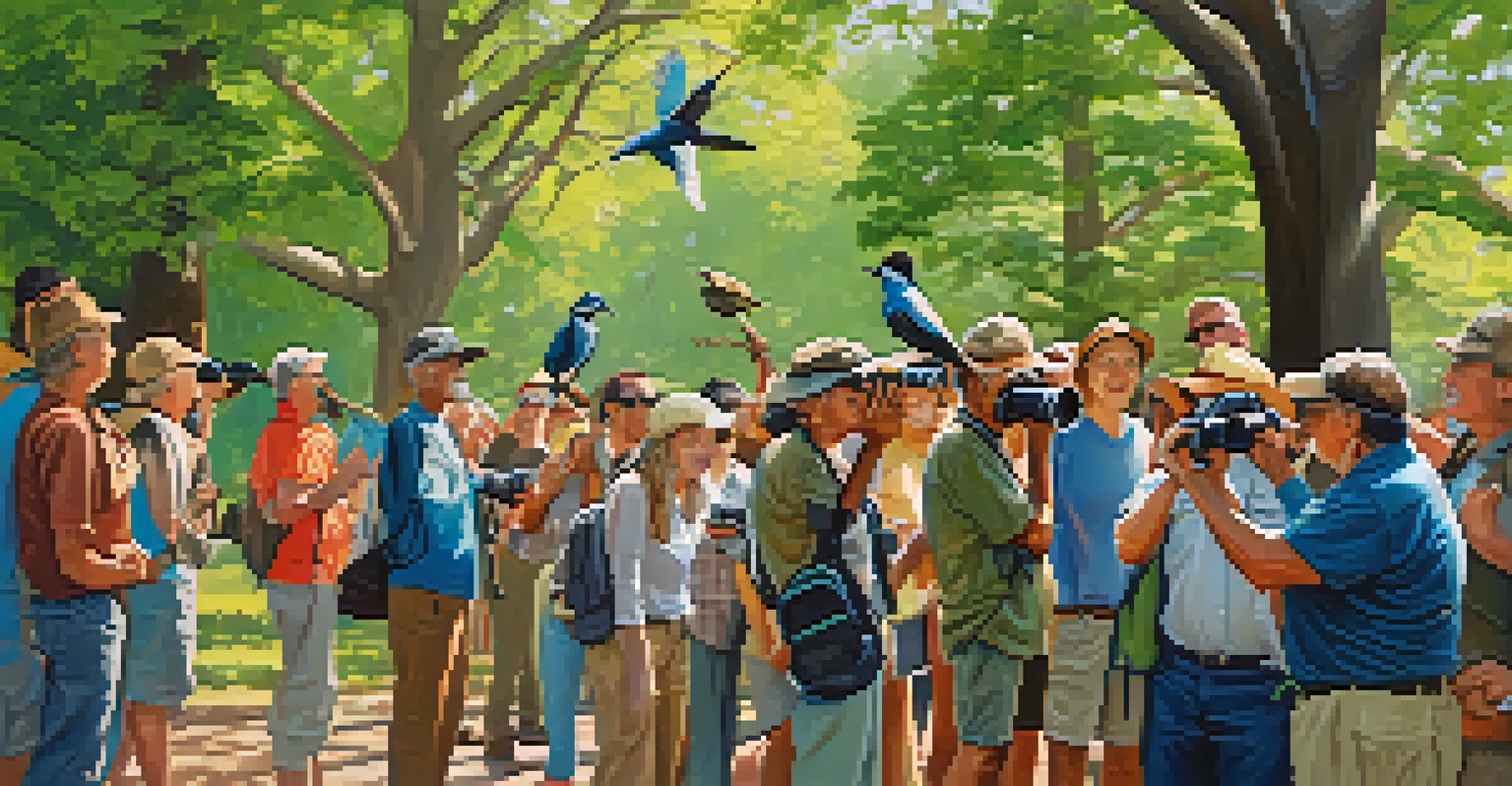Essential Skills for Birdwatching: How to Be an Effective Spotter

Understanding Birdwatching Basics: The First Step
Birdwatching is more than just spotting birds; it’s about connecting with nature. Before diving into the hobby, it's essential to familiarize yourself with the basics of birdwatching. This includes understanding different bird species, their behaviors, and habitats, which will enhance your overall experience.
In every walk with nature one receives far more than he seeks.
A great starting point is learning to identify local birds by their colors, shapes, and calls. Many resources are available, such as field guides or bird identification apps, which can serve as handy companions on your birdwatching adventures. Plus, observing birds in your backyard can give you practical experience.
By building a solid foundation in birdwatching basics, you’ll set yourself up for success in spotting and identifying various species. Remember, each bird has its unique story, and understanding these stories will deepen your appreciation for the avian world.
Developing Patience: A Key to Spotting Success
Patience is perhaps the most critical skill for any birdwatcher. Birds can be elusive, and it often takes time to spot them, especially in busy habitats. Cultivating patience means being prepared to wait silently and attentively, allowing birds to reveal themselves in their own time.

Consider this: you’re sitting in a serene location, with a warm breeze and soft rustling leaves. The more quietly you remain, the more likely you are to witness birds going about their daily activities. This stillness can lead to those magical moments when a vibrant bird suddenly appears before you.
Birdwatching Basics for Beginners
Familiarize yourself with local bird species and their behaviors to enhance your birdwatching experience.
Embracing patience not only enhances your birdwatching skills but also fosters a deeper connection with nature. It's about enjoying the journey and learning to appreciate the beauty surrounding you while waiting for that perfect sighting.
Mastering Observation Skills: Train Your Eyes and Ears
To become an effective birdwatcher, you need to hone your observation skills. This involves training your eyes to spot movement and your ears to recognize bird calls. Birds often hide in foliage or blend into their surroundings, so developing a keen sense of observation is essential.
Birdwatching is not just a hobby; it’s a way to connect with nature and find peace in the chaos of life.
One effective technique is to practice 'stillness and silence.' As you approach a birding location, take a moment to pause and listen. Often, the sounds of chirping or rustling can lead you to your next sighting. Over time, you’ll learn to distinguish between different calls, enhancing your overall birdwatching experience.
By sharpening your observation skills, you'll not only spot more birds but also begin to appreciate their unique behaviors and interactions. Every detail you notice adds richness to your birdwatching adventures.
Using the Right Equipment: Tools for Effective Birdwatching
Having the right equipment can make a world of difference in your birdwatching experience. Essential items include binoculars, a field guide, and a notebook to record your findings. Good-quality binoculars allow you to see birds up close without disturbing them, enhancing your observation.
When choosing binoculars, look for a model that strikes a balance between magnification and field of view. A popular choice for birdwatchers is an 8x42 model, which offers a wide field for spotting while still providing clarity. Don’t forget to bring a field guide or app to help with identification!
Patience is Key in Birdwatching
Cultivating patience allows you to connect with nature and increases your chances of spotting elusive birds.
With the right tools at your disposal, you’ll feel more confident and prepared to tackle any birdwatching adventure. Remember, the goal is to immerse yourself in the experience, and having the right equipment can significantly enhance that.
Understanding Bird Behavior: Anticipate Their Movements
Understanding bird behavior is a game changer for effective birdwatching. Each species has its unique habits and routines, which can help you predict where they might be at different times of the day. For example, many birds are most active during the early morning and late afternoon.
By observing patterns in feeding, nesting, and migration, you can increase your chances of spotting various species. For instance, knowing that certain birds prefer specific types of habitats can guide you to the right locations. This knowledge transforms simple observation into a more strategic endeavor.
As you learn more about bird behavior, you’ll find yourself becoming more adept at spotting them. Not only will this enhance your skills, but it will also deepen your appreciation for the complexity of the avian world.
Joining a Birdwatching Community: Learn and Share
Birdwatching can be a solitary pursuit, but joining a community can enrich your experience. Connecting with fellow birdwatchers allows you to share tips, experiences, and sightings, fostering a sense of camaraderie. Many local groups organize birdwatching events, workshops, and outings that can help you learn and grow.
Being part of a community provides access to a wealth of knowledge. You can learn from experienced birdwatchers about specific techniques or locations that are particularly rewarding. Plus, sharing your own experiences can inspire others and foster a collective appreciation for birding.
Join a Birdwatching Community
Engaging with fellow birdwatchers fosters camaraderie and enriches your learning and sharing experiences.
Engaging with a birdwatching community not only enhances your skills but also creates lasting friendships. It’s a wonderful way to stay motivated and excited about your birdwatching journey.
Respecting Nature: Ethical Birdwatching Practices
As birdwatchers, it’s crucial to respect nature and practice ethical birdwatching. This means observing birds from a distance without disturbing their natural behaviors. Approaching nests or nests too closely can lead to stress for the birds and could even endanger their young.
Always follow the 'Leave No Trace' principles, ensuring you leave the environment as you found it. This includes not littering and being mindful of the sounds you make. Respect for wildlife is not only a responsibility but also a way to ensure birdwatching remains a sustainable and enjoyable activity for future generations.

By adopting ethical practices, you contribute to the preservation of bird habitats and the well-being of avian populations. Remember, the ultimate goal is to enjoy and appreciate these incredible creatures while ensuring their safety and protection.